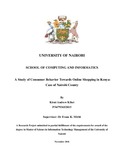| dc.contributor.author | Kibet, Kirui Andrew | |
| dc.date.accessioned | 2017-01-09T13:22:01Z | |
| dc.date.available | 2017-01-09T13:22:01Z | |
| dc.date.issued | 2016 | |
| dc.identifier.uri | http://hdl.handle.net/11295/100034 | |
| dc.description.abstract | iii
ABSTRACT
According to a recent UNCTAD report by Fredriksson(2015) that there is a huge potential for growth of e-commerce economies in Kenya but growth rate has been slow from 2012 to 2015 at the report states that growth rate in Kenya from 2012 to 2015 has been at 2% YoY and is expected to grow at that rate till 2018. This growth rate is way below the average when compared to other regions in the world.
The study proposed one main objective which was to assess the behaviours of consumers towards online shopping in Nairobi County, Kenya. The specific objectives included selecting an appropriate framework from previous research studies, collect data and use it to assess the adopted framework. The final specific objective was to make necessary recommendations to the framework based on the results of study. The theoretical framework that informed the research was the Decomposed Theory of Planned Behaviour (DTPB) which was operationalized through a conceptual framework.
The research methodology used in this study was of deductive approach and an explanatory research design. A structured questionnaire was administered in both electronic and paper form to collect data. The sample population size was 384 and the chosen to get the respondents was purposive random sampling method. The data was analyzed using statistical software and the findings presented in frequencies, percentages and Partial Least Square model which was used for hypotheses testing.
Out of the 384 questionnaires issued, 356 respondents had full responses that could be used for data analysis. The results showed that 97.2% of the respondents had shopped online in the past while 2.8% had never shopped online. The study found out that 10 out 13 hypothesized relationships defined in the conceptual framework were positively supported by the data collected.
The findings of this study has provided positive contribution to field e-commerce research in Kenya by assessing the behaviors of online consumers and the adoption of the technology. The study recommended further longitudinal research is needed to study the behaviours of consumers towards online shopping to assess their frequency of goods or service purchase and amount spent over a period of time. | en_US |
| dc.language.iso | en | en_US |
| dc.publisher | University Of Nairobi | en_US |
| dc.rights | Attribution-NonCommercial-NoDerivs 3.0 United States | * |
| dc.rights.uri | http://creativecommons.org/licenses/by-nc-nd/3.0/us/ | * |
| dc.title | A Study Of Consumer Behavior Towards Online Shopping In Kenya: Case Of Nairobi County | en_US |
| dc.type | Thesis | en_US |



